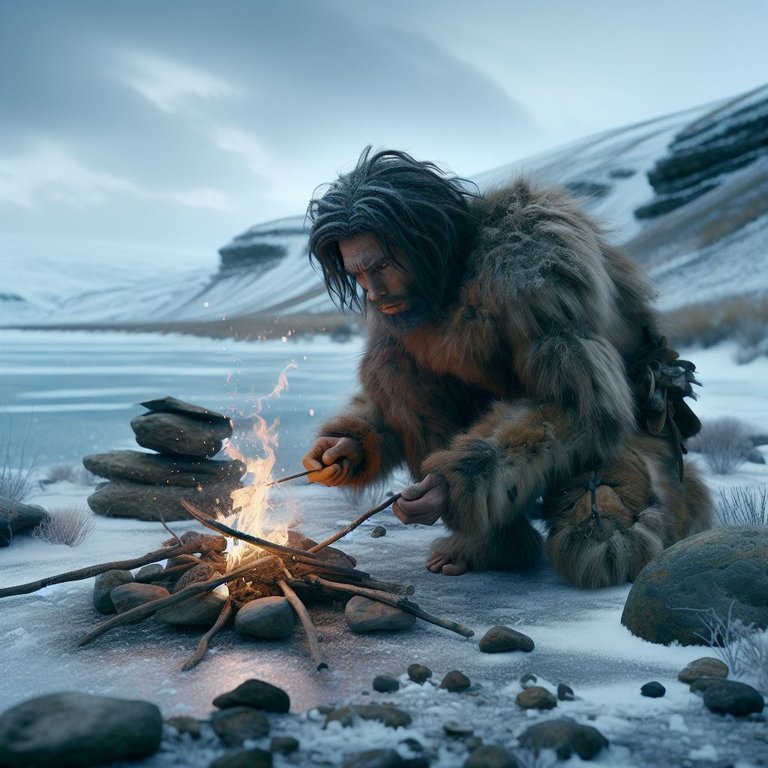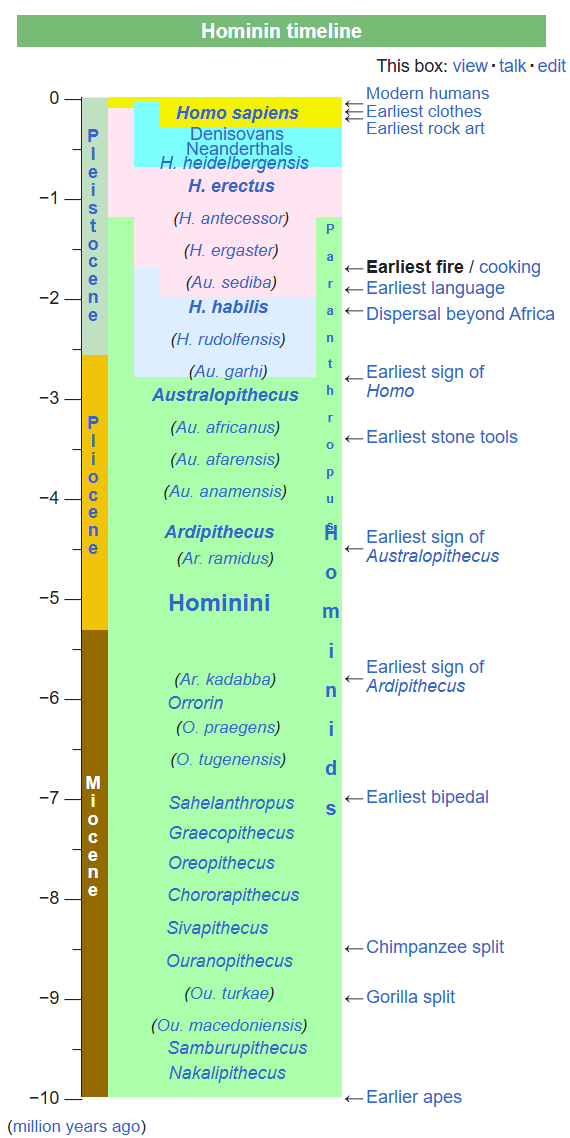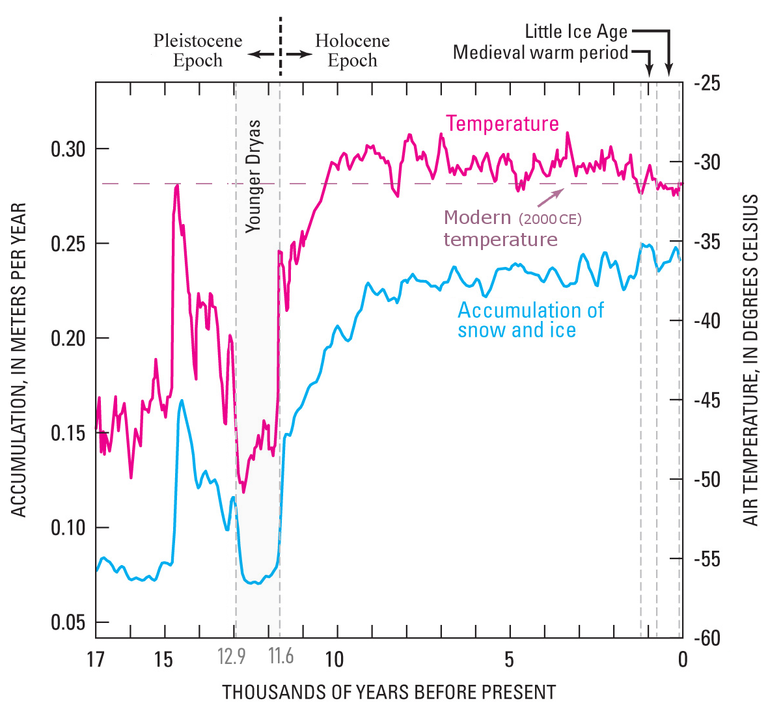Fire to Podcast
Fire to Podcast
I was catching up on my podcast listening this weekend, and was listening to Hard Fork, a podcast hosted by Kevin Roose and Casey Newton. I have been a long term listener of their work and consider their podcast the basis of my AI news and knowledge. In this particular episode, Kevin and Casey were doing something that is unusual for them, they were counting down 100 most iconic technologies that have impacted human civilization. They have never done such a thing before, so I was surprised. I am even more surprised by the fact that tech and AI geeks like them will put FIRE is the most iconic discovery for the humankind.

Generated by Designer in Microsoft Copilot
Being a geologist, I have always been fascinated by the evolution of humans during the last ice age. We have seen many ice ages in the past, but due to the ice cores from Greenland, we have near complete history of temperature for the last ice age. To be more precise, I must say, we have a complete history from temperature, atmospheric composition and ice accumulation for the last 117,000 years at a seasonal scale. Geologists who are familiar with fossil record in rocks, never have this much precision for the rest of the geologic time. Why? Because fossil/rock record rarely give precisions lower than 1 millon years!
Fire and Human Evolution
One thing that struck me unusual with Kevin and Casey, that they said, controlling the fire, making is personal and family activity around camps was probably the earliest large scale story telling and therefore, the earliest form of spoken words as a mode of extended communication. As we know, fire is not really invented, but perhaps its control as a personal or family/group use was discovered around 1.7 Ma.

We also know with fire came the following:
- Cooking
- Tool making, and later metal works
- Light
- Warmth and Protection against predators
- Social Interaction (earliest 'podcasts')
It's this last bit, that is rarely spoken about, but it is probably very important as social norms and the very foundation of 'civilization' began to form around campfires powered by spoken words. The first sense of community, family, social media begin to form around fire with spoken and written symbols (petroglyphs).
Surviving the Younger Dryas
I don't know if you know about a time called Younger Dryas, but it is a time between 12900 yrs - 11600 yrs before present. This is based on ice cores from Greenland, and it records a major drop of surface temperature (about 10 degree C drop in a season or two) during that time. Let me tell you a 10 degree C average temp drop anywhere in the northern hemisphrere is a big deal. It is basically turning on the ice age dial in an instant, very similar to to the movie Day After Tomorrow if you remember it. Only difference is this isn't a movie, this was real.

Trouble is both the nearest human species, likely Homo neanderthalensis (there is argument on when exactly they disappear) and definitely Homo sapiences were active during the Younger Dryas, and survived it! In northern and central Europe, mostly in caves and plains, and in the North America, in the great plains. They survived the Younger Dryas, when they saw temperature plunge almost in one or two seasonal winters, and they visibly seen the great ice sheets from the North advance to their door steps! The polar winter lasted for 1000 years+!
The only way they could survive the Younger Dryas, is because they have harvested fire. They could cook food, which made it easier to digest and safer to eat with higher calories that was essential to survive the cold. Without the fire, we wouldn't have been here. Most of the large mammals and megafauna (mammoths, mastodons, giant ground sloths, saber-tooth tigers) of the North America couldn't survive the Younger Dryas. Humans did!
Thanks to the fire!


Let's all thank Prometheus for his gift.
And that thought reminds me of my absolute favorite poem (which surprisingly isn't a haiku). From Goethe:
Cover your heaven, Zeus,
With foggy clouds,
And practice, like a boy
Who beheads thistles,
On oak-trees and mountain-tops;
You still must leave
my Earth to me,
And my hut, which you did not build,
And my stove,
Whose glow
You envy me.
I know no poorer creatures
Under the sun, than you, Gods!
You barely sustain your majesty
with sacrificial offerings
And exhalated prayers
And would wither, were
Not children and beggars
Hopeful fools.
When I was a child,
And did not know where from or to,
I turned my seeking eye toward
The sun, as if beyond there was
An ear to hear my complaint,
A heart like mine,
To have mercy with the embattled one.
Who helped me
Against the Titans' might?
Who saved me from Death,
From Slavery?
Did you not accomplish it all yourself,
Holy glowing Heart?
And glowed, young and good,
Deceived, thanks for salvation
To the sleeping one up there?
Shall I honour you? What for?
Have you softened the pains,
Ever, of a burdened one?
Have you silenced the tears,
Ever, of an anguished one?
Was I not forged into a Man
By almighty Time
And eternal Fate,
My masters and yours?
Do you imagine
I should hate life,
Flee to the desert,
Because not every
Flowering dream bloomed?
Here I sit, forming humans
In my image;
A people to be like me,
To suffer, to weep,
To enjoy and to delight themselves,
And to not attend to you –
As I.
Yes, I guess that is the only iconic technology our ancestors stole from the gods :)
In theory aren't we all Prometheus's children?
In addition, they associate the intelligence development with these gatherings around the fire while solving how to cook each animal part from the hunt!
Yes, I say that was likely
And some even add that eating meat adds on top on that 😬😬😬
But that topic creates a bit of noise around
Checking manual curations, this one made me smile. U r doing well monitoring #science and the best thing is you r a real life scientist as well. 💕
Thanks for being a part of hive 😊
:)
We are very resilient. We will only be replaced by something smarter.
or not replaced by anything
Very interesting. I really need to start listening to more podcasts. It sounds like there are some good ones out there, but I usually prefer to listen to music. I feel like I am cheating myself out of some good knowledge.
I am a big fan of spoken words. I guess I got is as a kid listening to radio. I like podcast because, my eyes are getting old and I hate glasses, while podcast is handsfree and I can listen while walking
That's a good point about getting old. I have to use glasses when I am on my phone at night now. I'll have to think about getting into some more podcasts.
Fire let us survive Earth Nature, space technology might help us survive the next threat from outer space like a giant rock that might hit Earth and wipe out all life. But at the same time technology might be our downfall: like a nuclear war or AI and robotics eventually making humans obsolete.
I have news for you; if a giant rock hits earth no technology can save 99% of the human population:) Neither Hollywood movies nor Elon Musk can save you. It doesn’t matter where it hits, it will be a mass extinction!
You are correct about it at this stage of your technological ability, but further in the future some technologies can become a viable to deflect asteroids:
https://www.planetary.org/articles/asteroid-deflection-techniques-to-save-the-earth
NASA even tried a first test a few years ago:
https://www.nasa.gov/news-release/nasas-dart-mission-hits-asteroid-in-first-ever-planetary-defense-test/
Yes, I am talking about present day technology.
You know in hopeful times like in 50s, 60s and 70s people thought by 2000s we will all have flying cars and will colonize Mars. Clearly we have fallen behind those expectations:)
PS. By the way; you do know that I live in Houston. I have multiple colleagues who work at NASA. Vibe there is bit less hopeful than they publish externally:)
I love my podcasts too man. Two that I like a lot are The Blindboy Podcast and The Diary of A CEO.
Pretty interesting that the guys picked out Fire as the biggest impact to mankind.
I wonder will they change there mind in the next ten years when AI is seen for what it is fully??
Thanks for your contribution to the STEMsocial community. Feel free to join us on discord to get to know the rest of us!
Please consider delegating to the @stemsocial account (85% of the curation rewards are returned).
You may also include @stemsocial as a beneficiary of the rewards of this post to get a stronger support.
Humans immune system back can resist anything resistable I guess that is why they are at the top of everything' I really would like to go back in time to see how they did it though. I even read they were using leaves as cup for water back when they where still uncivilized.
It's amazing how the early humans were able to adapt, without anything we think normal for nowadays like weather forecasts or global news.
In the area between The Netherlands and The U.K was a sunken land, called Doggerland - my daughter wanted a cool topic for a school project, even her teacher didn't knew what it was.
Very interesting, the early steps of human kind